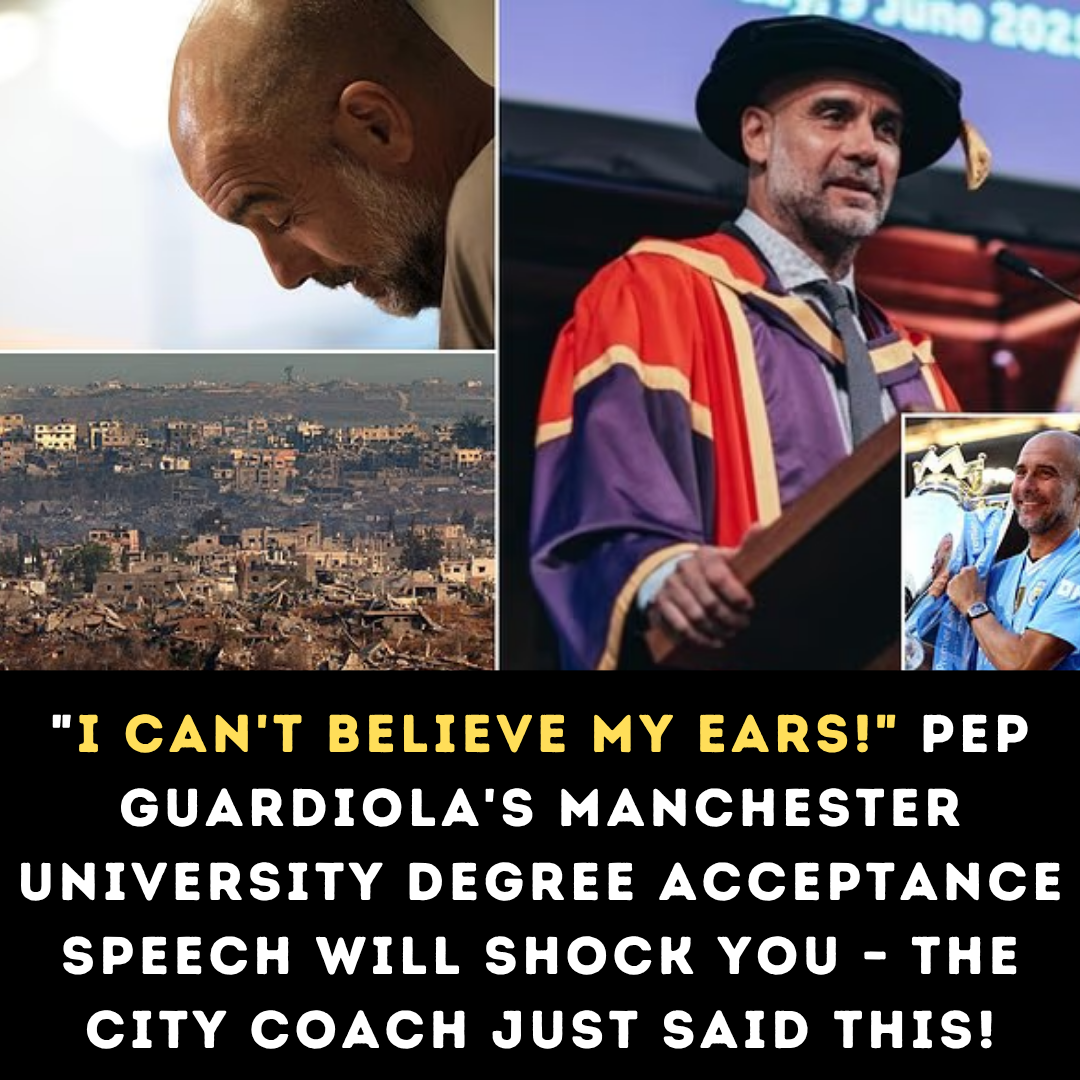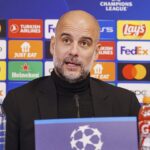Pep Guardiola’s Gaza Speech: A Deeper Analysis of Sports, Politics, and Social Responsibility

The intersection of sports and politics has always been a contentious space, where athletes and coaches must navigate the delicate balance between their professional roles and their personal convictions. This tension came into sharp focus recently when Pep Guardiola, Manchester City’s celebrated manager, used the platform of receiving an honorary degree from the University of Manchester to deliver what many are calling a politically-charged speech about the situation in Gaza.
The 54-year-old Spanish tactician, widely regarded as one of the greatest football minds of his generation, chose a moment of personal triumph to shed light on one of the world’s most complex and devastating conflicts. His decision to speak about Gaza during what should have been a celebratory academic ceremony has sparked widespread discussion about the role of public figures in addressing global humanitarian crises.
The Context: A Manager’s Journey to Manchester
To understand the significance of Guardiola’s speech, one must first appreciate his journey with Manchester City and his deep connection to the city of Manchester. Since his arrival at the Etihad Stadium in 2016, Guardiola has transformed not just the football club but also established himself as a prominent figure in the broader Manchester community.
His achievements on the pitch are nothing short of extraordinary. Six Premier League titles have established Manchester City as the dominant force in English football, a remarkable feat considering the competitive nature of the league. The six domestic cups further demonstrate his ability to maintain excellence across multiple competitions, while the Champions League triumph in 2023 represented the pinnacle of his tenure, finally delivering the trophy that had eluded the club for so long.
But Guardiola’s impact extends far beyond trophies and tactical innovations. His philosophical approach to football, emphasizing possession-based play and intelligent movement, has influenced coaching methodologies worldwide. His teams don’t just win; they play with a distinctive style that has redefined modern football aesthetics.
The honorary doctorate from the University of Manchester represents recognition not just of his sporting achievements but of his broader contribution to the city’s cultural and social fabric. Universities typically reserve such honors for individuals who have made significant contributions to society, suggesting that Guardiola’s influence is seen as extending well beyond the football pitch.
The Ceremony: A Platform for Conscience
The ceremony at Whitworth Hall, where Guardiola received his honorary degree from Chancellor Nazir Afzal, would have been expected to follow traditional academic protocols. Such events typically feature speeches about education, achievement, and future aspirations. However, Guardiola chose to use this platform differently, demonstrating his willingness to leverage his visibility for what he clearly views as a matter of urgent humanitarian concern.
The choice of venue and timing is particularly significant. Academic institutions have long served as spaces for intellectual discourse and social commentary. By choosing this moment to speak about Gaza, Guardiola was following a tradition of using educational platforms to address pressing social issues. Universities have historically been centers of debate about social justice, human rights, and political change.
Chancellor Nazir Afzal’s role in presenting the degree adds another layer of context. Afzal, a prominent figure in British legal circles and a vocal advocate for social justice, represents the kind of institutional leadership that might be expected to support discussions about global humanitarian concerns.
The Gaza Crisis: Understanding the Context
Guardiola’s decision to address the situation in Gaza comes against the backdrop of one of the world’s most enduring and complex conflicts. The statistics he referenced – nearly 55,000 deaths according to the Gaza Health Ministry since Israel intensified its military campaign – represent not just numbers but a humanitarian catastrophe of enormous proportions.
The Gaza Strip, a small Palestinian territory bordered by Israel and Egypt, has been the site of recurring conflict for decades. The latest escalation has drawn international attention and sparked debates about proportionality, civilian casualties, and the broader Israeli-Palestinian conflict. The humanitarian situation has deteriorated significantly, with limited access to basic necessities, medical care, and safe shelter for the population.
For Guardiola to reference these statistics during his speech indicates a level of awareness and concern about global events that extends far beyond his professional responsibilities. It suggests a worldview that sees successful public figures as having responsibilities that transcend their immediate spheres of influence.
The Tradition of Athlete Activism
Guardiola’s speech fits within a broader tradition of sports figures using their platforms to address social and political issues. From Muhammad Ali’s stance against the Vietnam War to Colin Kaepernick’s protests against racial injustice, athletes have long recognized that their visibility comes with both opportunities and responsibilities.
In football specifically, there’s a rich history of political engagement. From Carlos Tevez’s support for the Mothers of the Plaza de Mayo to Marcus Rashford’s campaign against child poverty, football figures have increasingly used their platforms to advocate for causes they believe in. Guardiola himself has previously spoken about Catalan independence and other political issues, establishing himself as someone willing to engage with controversial topics.
The difference in this instance is the setting and the specific nature of the conflict he chose to address. Gaza represents one of the most polarizing issues in international politics, with passionate advocates on multiple sides. By choosing to speak about this topic, Guardiola was inevitably stepping into a space where any statement would be scrutinized and potentially criticized from various perspectives.
The Response: Reactions and Implications
The immediate aftermath of Guardiola’s speech has generated significant discussion across multiple spheres. Social media platforms have seen intense debate, with supporters praising his courage to speak on humanitarian issues and critics questioning whether a football manager should use such platforms for political commentary.
Within the football community, reactions have been mixed. Some see his comments as appropriate use of his platform to highlight humanitarian concerns. Others argue that sports figures should focus on their professional roles rather than engaging with complex political issues that they may not fully understand.
The broader media response has been equally diverse. Some outlets have framed his comments as evidence of moral leadership, while others have questioned the appropriateness of mixing sports and politics. International media coverage has varied significantly depending on the political context of different countries and their relationships with the Middle East conflict.
The Academic Dimension: Universities and Global Conscience
The choice of an academic setting for Guardiola’s comments adds another layer of significance to his speech. Universities have traditionally served as spaces for free intellectual inquiry and debate about pressing social issues. The University of Manchester, in particular, has a history of engaging with global concerns and promoting social justice through various academic and community programs.
By delivering his comments in this setting, Guardiola was aligning himself with academic traditions of social commentary and intellectual engagement with world events. This context suggests that his comments were not spontaneous but rather a deliberate choice to use an appropriate forum for discussing serious global issues.
The university’s decision to honor Guardiola with a doctorate also reflects recognition of his broader social impact. Academic institutions increasingly recognize that influence and leadership extend beyond traditional academic fields, and that successful figures from various walks of life can contribute meaningfully to social discourse.
The Manchester Connection: Local Impact of Global Consciousness
Guardiola’s speech also reflects his deep integration into Manchester’s social fabric. The city has a strong tradition of social activism and international awareness, from its role in the anti-apartheid movement to its support for various humanitarian causes. By addressing global issues from this platform, Guardiola was speaking as someone who has become part of this tradition.
Manchester’s diverse population includes significant communities with connections to various global conflicts and humanitarian crises. Guardiola’s willingness to address such issues may resonate particularly strongly with community members who feel that their concerns are often overlooked in mainstream discourse.
The timing of his comments, during a ceremony celebrating his contributions to the city, suggests that he sees social consciousness as part of what he has brought to Manchester during his tenure. This perspective positions his humanitarian concerns not as separate from his professional role but as integral to his overall contribution to the community.
Broader Implications: Sports Leadership in Global Context
Guardiola’s speech raises important questions about the role of sports figures in addressing global humanitarian crises. As sports have become increasingly globalized and commercialized, successful coaches and athletes have gained unprecedented platforms and influence. With this influence comes questions about responsibility and appropriate use of these platforms.
The traditional view that sports figures should “stick to sports” is increasingly challenged by the reality that these individuals often have more visibility and influence than traditional political leaders or social activists. Their words can reach audiences that might never engage with conventional political discourse.
At the same time, there are legitimate questions about expertise and the potential for well-intentioned but poorly informed commentary to oversimplify complex issues. The Gaza conflict, in particular, involves historical, religious, political, and cultural dimensions that require deep understanding to address responsibly.
The Media Landscape: Coverage and Context
The coverage of Guardiola’s speech reflects broader challenges in how media organizations handle the intersection of sports and politics. Sports journalists are often not equipped to provide comprehensive context for political commentary by sports figures, while political reporters may lack the background to understand the sports context that makes such statements newsworthy.
This challenge is compounded by the speed of modern news cycles and the pressure to provide immediate analysis of events. Guardiola’s comments required understanding of his background, his relationship with Manchester, the academic context of his speech, and the complex political situation he chose to address.
Social media has further complicated this landscape, allowing immediate reaction and commentary without the filter of editorial oversight. The result is often polarized discussion that focuses more on the fact that a sports figure made political comments than on the substance of what was said.
Looking Forward: Implications for Sports and Society
Guardiola’s decision to address the Gaza situation during his honorary degree ceremony represents more than just one individual’s personal statement. It reflects broader trends in how successful public figures understand their social responsibilities and use their platforms.
The increasingly global nature of sports means that figures like Guardiola have audiences that span continents and cultures. Their statements can influence public opinion and potentially affect policy discussions in ways that would have been impossible for sports figures in previous generations.
At the same time, this influence comes with risks. Misstatements or oversimplifications can have serious consequences, potentially inflaming tensions or providing ammunition for those seeking to minimize legitimate concerns about humanitarian crises.
Conclusion: The Complexity of Conscience and Platform
Pep Guardiola’s speech about Gaza during his honorary degree ceremony represents a significant moment in the ongoing evolution of how sports figures engage with global social and political issues. His decision to use this platform to highlight humanitarian concerns demonstrates both courage and awareness of the responsibilities that come with influence and visibility.
The reaction to his comments reflects broader societal tensions about the appropriate role of public figures in addressing complex political issues. While some see such engagement as evidence of moral leadership and social responsibility, others view it as overstepping professional boundaries or potentially harmful oversimplification of complex issues.
What seems clear is that the traditional separation between sports and politics continues to erode in an increasingly connected world. Figures like Guardiola, with their global platforms and influence, will continue to face choices about when and how to use their visibility to address issues they see as important.
The Manchester ceremony thus represents more than just recognition of football achievements. It symbolizes the complex intersection of professional success, social responsibility, and global consciousness in the modern world. Whether one agrees with Guardiola’s decision to speak about Gaza or not, his willingness to do so reflects a recognition that influence comes with opportunities and obligations that extend far beyond the football pitch.
As sports continue to evolve as a global cultural force, the questions raised by Guardiola’s speech will become increasingly important. How should successful sports figures use their platforms? What responsibilities do they have to address global issues? And how can society best navigate the intersection of entertainment, achievement, and social conscience?
These questions don’t have easy answers, but Guardiola’s speech ensures they will continue to be part of ongoing discussions about sports, society, and the responsibilities that come with public influence. In choosing to speak about Gaza during a moment of personal celebration, he has added his voice to those who believe that success brings not just privilege but also obligation to engage with the world’s most pressing humanitarian concerns.
The ultimate impact of his words will be measured not just in immediate reactions but in whether they contribute to broader awareness and discussion of humanitarian issues that might otherwise receive less attention. In this sense, his speech represents both a personal statement and a contribution to the ongoing dialogue about how successful individuals can and should use their platforms to address global challenges.















